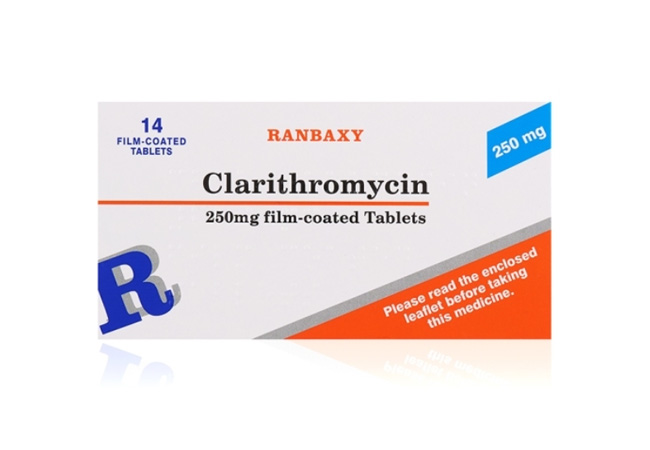Clarithromycin is an antibiotic that belongs to the macrolide class of medications. It works by stopping the growth of bacteria, making it effective against a variety of bacterial infections. It is often prescribed for infections of the respiratory tract, including sinusitis.
Clarithromycin inhibits bacterial protein synthesis by binding to the 50S ribosomal subunit of the bacterial ribosome. This action prevents the bacteria from growing and reproducing, allowing the immune system to eliminate the infection.
Clarithromycin is generally effective in treating acute bacterial sinusitis, particularly when the infection is caused by bacteria that are sensitive to this antibiotic. It is known to be effective against common pathogens like:
- Streptococcus pneumoniae
- Haemophilus influenzae
- Moraxella catarrhalis
Clarithromycin is used to treat several types of bacterial infections, including:
- Sinusitis
- Acute bacterial sinusitis
- Pharyngitis
- Tonsillitis
- Bronchitis
- Pneumonia
- Skin infections
The dosage of clarithromycin for sinusitis varies based on the severity of the infection, the patient's age, weight, and overall health. The usual dosage for adults is:
- Immediate-release tablets: 250-500 mg twice daily for 7 to 14 days.
You may take this medicine with meals or milk or on an empty stomach. However, clarithromycin extended release tablets should be taken with food.
If you are using the extended-release tablets:
- Swallow the tablet whole. Do not break, crush, or chew it.
- While taking the extended-release form of this medicine, a part of the tablet may pass into your stools. This is normal and is nothing to worry about.
If you forget to take a dose, take it as soon as you remember, unless it's nearly time for your next dose. If this happens, just leave out the missed dose and take your next dose at the usual time. Never take 2 doses at the same time. Never take an extra dose to make up for a forgotten one. If you often forget doses, it may help to set an alarm to remind you. You could also ask your pharmacist for advice on other ways to remember to take your medicine.
Taking an extra dose of clarithromycin is unlikely to harm you or your child. However, it may give you temporary side effects, like stomach pain, feeling and being sick (nausea and vomiting), and diarrhoea. Talk to your pharmacist or doctor if you're worried or get severe side effects, or if you or your child take more than 1 extra dose.
Always use this medication exactly as your clinician has told you. Check with our clinical team or your GP or pharmacist if you are not sure.
Medicines and their possible side effects can affect individual people in different ways. The following are some of the side effects that are known to be associated with this medicine. Just because a side effect is stated here, it does not mean that all people using this medicine will experience that or any side effect.
The most common adverse effects are:
- Gastrointestinal adverse effects, such as diarrhoea, nausea, vomiting, abdominal discomfort, and dyspepsia.
- Decreased appetite and altered taste.
- Dizziness, headache, vasodilation, and vision disorders.
- Hearing impairment.
- Insomnia.
- Pancreatitis.
- Paraesthesia and skin reactions.
Antibiotic-associated colitis has been reported and may range in severity from mild to life-threatening.
- Consider this diagnosis in people who present with diarrhoea during or after treatment with any antibiotic.
- The risk is increased with longer durations of antibiotic treatment, multiple antibiotics prescribed concurrently, or multiple courses of antibiotics.
Other possible adverse effects include:
- Uncommon — angioedema, anxiety, arrhythmias, candidal infection, chest pain, constipation, drowsiness, eosinophilia, hepatic disorders, leucopenia, neutropenia, palpitations, QT interval prolongation, severe cutaneous adverse reactions (SCARs), tinnitus, vertigo, burping, dry mouth, epistaxis, muscle complaints, oral disorders, thrombocytosis, and tremor.
- Rare or very rare — myasthenia gravis and nephritis tubulointerstitial.
- Frequency not known — altered smell, hallucination, hypotension, seizure, thrombocytopenia, tongue discolouration, abnormal dreams, agranulocytosis, depersonalization, depression, mania, myopathy, psychotic disorder, renal failure, tooth discolouration, and urine discolouration.
For full information on side effects and correct use, see the patient information leaflet. If any side effects concern you, or you are experiencing any of the side effects mentioned in the patient information leaflet whilst taking this medication, please contact our clinical team or speak to your GP.
Hepatic dysfunction has been reported. This includes increased liver enzymes, and hepatocellular and/or cholestatic hepatitis (with or without jaundice). Hepatic dysfunction may be severe and is usually reversible. Cases of fatal hepatic failure have been reported. Stop Clarithromycin treatment and seek medical advice if signs and symptoms of hepatic disease develop, such as anorexia, jaundice, dark urine, pruritus, or tender abdomen.
Clarithromycin should be avoided in the following situations:
- Known allergy to clarithromycin or other macrolide antibiotics.
- History of jaundice or liver dysfunction associated with prior use of clarithromycin.
- Concurrent use of medications known to prolong QT interval or cause cardiac arrhythmias.
Get emergency medical help if you have signs of an allergic reaction to this medication. These include:
- Hives
- Dizziness
- Fast or pounding heartbeats
- Wheezing
- Difficult breathing
- Swelling of your face, lips, tongue, or throat.
It is important that you let us know which prescription, over-the-counter medicines and recreational drugs you are currently taking. You must also tell us about any other medical conditions that you currently have (or had in the past). This will help us ensure the prescribed medication is safe and appropriate for you to take.
For full information on warnings, medication interactions and contraindications, refer to the Patient Information Leaflet. Please read all packaging and the Patient Information Leaflet before taking any new medicine and inform our clinical team or your GP of medicines you are taking or intend to take.







